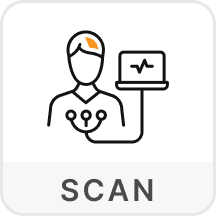 Clinic Location Select City
Clinic Location Select City 
 SCAN
SCANSCAN

Both
For all age group
About the test
ECG
What is an ECG?
An ECG or EKG is a non-invasive medical test that records the electrical activity of the heart. It is a quick and painless procedure that provides valuable information about the heart's functioning. The test helps doctors assess the heart's rhythm, rate, and any abnormalities in its electrical conduction.
During an ECG, electrodes are placed on the chest, arms, and legs to detect the heart's electrical impulses. These impulses/signals are then recorded on graph paper or displayed on a monitor, allowing doctors to analyse the heart's health and help diagnose various heart conditions, such as arrhythmias, coronary artery disease, and heart attacks. This test can also help evaluate the effectiveness of treatments and medications for heart-related issues.
How to Prepare for an ECG?
Dos:
- Wear comfortable, loose-fitting clothing that allows easy access to your chest, arms, and legs.
- Inform your doctor about any medications you are currently taking, as some may affect the ECG results.
- Relax and remain still during the test to avoid any interference with the readings.
Don'ts:
- Do not apply lotions, oils, or powder to your chest area on the day of the test, as they can interfere with the electrode adhesion.
- Avoid consuming caffeine or smoking for at least 2 hours before the test, as these can affect your heart rate.
- Do not engage in strenuous physical activity or exercise before the test, unless specifically instructed to do so by your doctor for a stress ECG.
Why is ECG Recommended?
An ECG lab test may be recommended by doctors for various reasons:
- To evaluate symptoms such as chest pain or discomfort, palpitations, shortness of breath, or dizziness, which may indicate an underlying heart problem like heart attacks or angina.
- To screen for heart disease risk factors, especially in individuals with a family history of heart conditions, high blood pressure, or diabetes.
- To monitor the effectiveness of treatments for heart conditions, such as medications or pacemakers.
- To assess the heart's response to physical stress during an exercise stress test.
- To detect any abnormalities in heart rhythm or structure, which may require further investigation or treatment.
